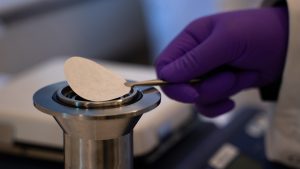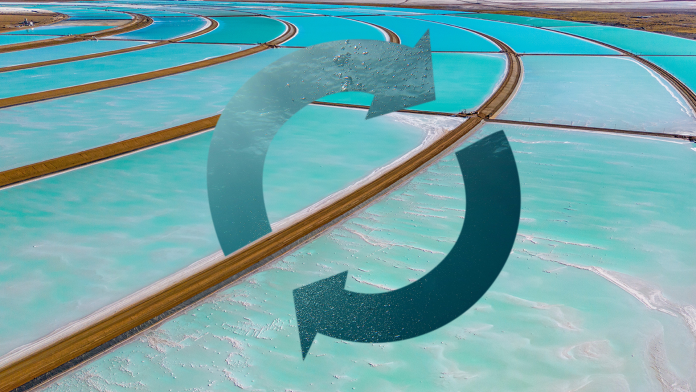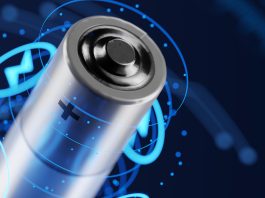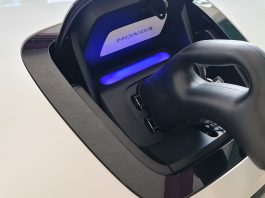Retein’s bioinspired filters improve resource extraction yields and cost-efficiency in battery recycling and mining.
The demand for lithium, critical for energy storage systems such as lithium-ion batteries, is projected to exceed supply by 2025.
Currently, lithium mining is predominantly conducted outside of Europe, in regions such as Chile, Australia, and China, intensifying Europe’s dependence on external sources.
Moreover, this reliance also constitutes geopolitical concerns for Europe since recycling the lithium already found in spent lithium-ion batteries is the only way to become somewhat lithium self-sufficient.
To address these challenges, the European Union has introduced stringent regulations under its new battery directive, mandating substantial recycling targets.

By 2025, 65% of lithium in batteries must be recycled within the EU, escalating to 80% by 2031. This regulation aims to decrease dependency on imported lithium and mitigate the environmental impacts of lithium mining by fostering circular resource handling.
Nature-inspired resource recovery filters
The push towards sustainability has spurred the development of advanced recycling technologies.
Traditional recycling methods often excel in recovering high-value materials like cobalt or copper from spent lithium-ion batteries while missing out on recovering satisfactory amounts of increasingly in-demand materials like lithium.
This increasing demand is driving the development of novel technologies to enable more efficient and selective recovery of lithium.
Moreover, novel technologies can also give more economically viable recycling methods than the ones currently on the market.
Retein develops industrial-grade filters that leverage nature’s outstanding precision and efficiency in recovering water-borne resources for reuse.
Inspired by cellular processes, these filters employ specific proteins capable of transporting targeted resources like lithium and water with high precision using minimal energy.
This method allows for both the selective recovery of lithium from spent batteries and the purification of water from industrial wastewater and process streams, significantly enhancing recycling efficiency and reducing environmental impact.
Retein’s technology works by incorporating proteins that transport the desired resource in a cell-like environment. Depending on the resource targeted, different proteins can be used to transport that resource specifically.
The cell-like structure is then stabilised into capsules to be more robust to external factors such as pressure and high concentrations. The stabilised capsules are incorporated into a polymer matrix to create a highly efficient filtering membrane. The incorporation of capsules into the polymer matrix provides a shortcut for the targeted resource through the otherwise densely packed membrane material.
How the filter works
The unique nature-inspired filter material is packaged into filtration modules of the standardised dimensions that are used across industries today. Retein’s filters are, therefore, well suited for use in existing installations without requiring major infrastructural changes while also catering to the needs of greenfield projects related to electrification.
The modular design of Retein’s solution allows for easy scaling to meet growing demand and adaptability to different operational sizes or lithium source types.
The enhanced flexibility with respect to source types allows for streamlined metal extraction and refining with minimal adaption to fluctuations in process water composition. This is due to the unique capabilities provided by nature’s finest resource recovery.
In comparison to commercially available filters, Retein offers filters that unlock new possibilities in recovering valuable water and resources from water mixtures.
The highly specific separation will allow for circular processing for economic and environmental benefits. The current state-of-the-art separation process uses one or, at best, two molecular characteristics to separate through.
In contrast, channel proteins have been tuned by nature to separate on no fewer than four characteristics: size, charge, hydrophobicity, and specific intermolecular interactions.

Retein’s filters, therefore, have the potential to provide outstanding performance when it comes to molecular precision recovery of lithium and other water-borne resources at minimum energy usage.
Minimising operational risks in battery recycling
Efforts toward efficient resource use are aligned with the targets within the United Nations’ Sustainable Development Goals (SDGs). Responsible water and energy management is increasingly viewed as a social and environmental license-to-operate issue, and increasingly stringent environmental regulations are being put in place.
Retein’s efforts in metal and water recovery are particularly geared towards improvements in SDG 6 (Clean Water and Sanitation) and SDG 7 (Affordable and Clean Energy).
By improving resource recovery yields and quality while reducing waste, Retein helps clients to increase their profits while simultaneously decreasing their risks through a solution that maximises yield while minimising negative impact, just like nature does.
This utilisation of resources that are already present inside the process also allow for battery recyclers and miners to capitalise on improved margins and a more cost-competitive offering towards their customers.
Retein is demonstrating improvements in lithium and water recovery yield and purity, as well as lowered operational cost and risks through pilot testing in multiple settings.
If you are an actor in battery recycling or mining who would like to know more about Retein’s offering and what synergies a partnership could present for you, do not hesitate to get in touch.
Please note, this article will also appear in the 18th edition of our quarterly publication.









